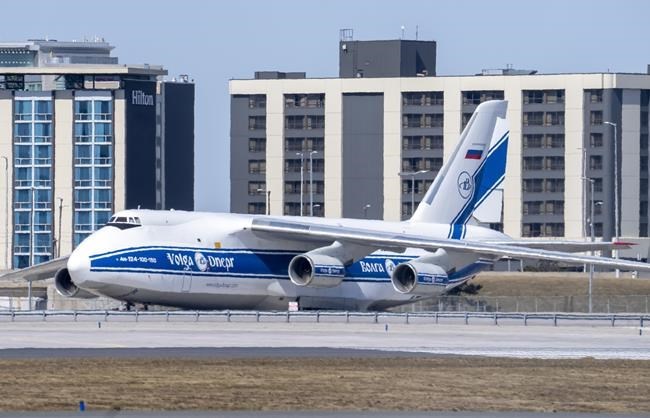OTTAWA — Moscow is warning that relations with Canada are "on the verge of being severed" after the federal Liberal government moved to forfeit a massive Russian cargo plane.
Prime Minister Justin Trudeau visited Ukraine on the weekend, where he announced that Canada officially seized an airplane that had been sitting on the tarmac at Toronto's Pearson International Airport since February 2022.
"We perceive this act as cynical and shameless theft," Russia's foreign ministry said in an English-language statement posted Tuesday.
A year ago, Canada became the first G7 country to enact a law that allows Ottawa to not just seize assets held by sanctioned people, but to forfeit the money and have it diverted to victims of a sanctioned regime.
The law remains unused, but Trudeau said Ottawa plans to begin a process to either transfer the plane to Ukraine or sell it for money that would support the country's recovery.
"We're going to do it as quickly as possible, but I can tell you the Ukrainians are very pleased that the path has started," Trudeau said Saturday during an unannounced visit to Kyiv.
The Russian-registered Antonov AN-124 is owned by the firm Volga-Dneper, which Canada sanctioned in April. It is one of the largest aircraft in the world, and Ottawa fears Russia could use it to deliver military supplies in its invasion of Ukraine.
The government officially seized the aircraft through a June 8 cabinet order.
"I think there was pressure on the government to do something about it, because effectively it couldn't be moved, because Russian aircraft are prohibited from Canadian airspace," said William Pellerin, an Ottawa-based trade lawyer with the firm McMillan LLP.
He said the owners can launch a court challenge of the seizure up until the time Ottawa files a formal court application to forfeit the asset. At that point, the firm would receive written notice and have a chance to challenge the application.
"It's fair to say that this opens us up to reprisals. I think it's well known that the government of Russia has sanctioned a number of Canadians," said Pellerin.
To that end, Moscow said it is prepared to retaliate over "stolen Russian property," noting the plane landed in Toronto in order to deliver COVID-19 testing kits.
"The Russian side warns that the practical implementation of this decision will entail the most serious repercussions for Russian-Canadian relations, which are already on the verge of being severed," the ministry wrote.
"We reserve the right to retaliate in line with the reciprocity principle."
Moscow and Ottawa have summoned each other's ambassadors numerous times, with Canada arguing Russia is committing war crimes and spewing homophobic rhetoric on social media while the Kremlin says Canada isn't adequately protecting its Ottawa embassy.
"It's not surprising that Russia is taking this retaliatory stance," said Pellerin, who advises Canadian and international firms, but not Russian firms, on navigating the sanctions regime.
"Canada's approach to seizure and forfeiture is the first of its kind globally. It is certainly the case that Russia would be deeply concerned if other countries followed Canada's approach."
Meanwhile, Ottawa has yet to follow through on a promise six months ago to try seizing funds it says are held by Russian oligarch Roman Abramovich, with no application filed in any provincial court as of last month.
A Senate report last month warned that the legislation could put Canadian companies abroad at risk, and could undermine the rule of law if the provisions aren't enforced through due process.
"The government of Canada should proceed prudently with respect to any forfeiture process," the report argued, adding that working in lockstep with allies could "mitigate any unintended consequences."
This report by The Canadian Press was first published June 14, 2023.
Dylan Robertson, The Canadian Press




